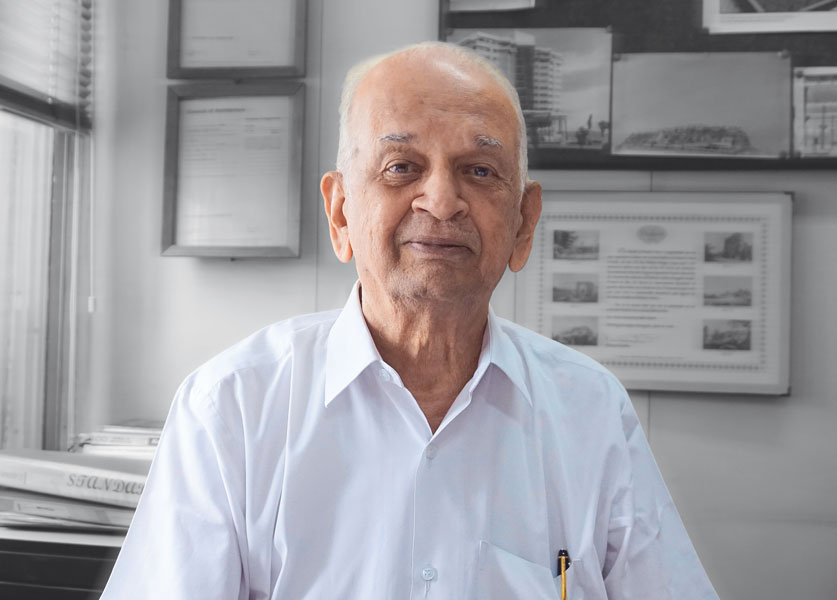
With the demise of a vintage Rotarian, S L Chitale, popularly known as Kris to all his friends, an era has come to an end in the Rotary Club of Madras, RID 3232. His Rotary journey lasted 54 years.
Most Rotarians in India would not be aware that one of their biggest triumphs — winning the battle against polio — began in a major way in India with the prestigious RC Madras in 1989. This happened when the then RI President Hugh Archer said “we’ll give you $4.6 million for polio immunisation for five years,” Chitale had told Rotary News in an interview in Sep 2015.
As a junior reporter in The Indian Express who regularly covered the immunisation work done by the club in the early1980s, I well remember the impeccably dressed gentleman in white who passed on his infectious enthusiasm and passion for protecting children against debilitating diseases and getting good coverage of this Rotary programme in then Madras.
He was an absolute gentleman to the core and always set an example to other Rotarians by showing the importance of personal involvement.
— Ranjit Pratap, President, RC Madras
Chitale joined RC Madras in 1965; earlier this service-minded architect, one of the most eminent in Chennai, was a Round Tabler. In 1979, as the club celebrated its golden jubilee, its president V Chidambaram urged club members to do a big project which was bound to leave a lasting impact. As it was also the International Year of the Child, they zeroed in on vaccination for measles, then the biggest killer of children and collaborated with RC Whitby of Canada, RID 7070, which agreed to gift the Indian Rotarians 65,000 doses. “This was sufficient to immunise the children of only Nungambakkam or Mylapore, and not Madras,” Chitale had quipped in the interview. But this partnership gave the club its biggest benefactor and Chitale himself, a lifelong friend in Ken Hobbs, who came down as a volunteer.
Hobbs got so hooked to the Madras Rotarians and the immunisation project that for the next 30 years he visited the metro every year. With eminent virologist and past president of RC Madras, Dr Jacob John, too being part of the team, measles immunisation really took off.
Led by Chitale, a bunch of Rotarians really worked hard to get the government duties waived, and Air India to fly the vaccines free of cost for five years. Shoring up the cold chain to ensure “that we didn’t give just distilled water as vaccination doses to our children” required ₹40 lakh, a huge amount in those days but that was managed too.
Polio vaccination
Meanwhile, much earlier in 1979, RI had begun its polio vaccination initiative with the Philippines. “While there it remained more of a government project, Indian Rotarians got wholeheartedly involved in polio immunisation and Tamil Nadu was the first State in India to be declared polio-free,” Chitale recalled.
Asked what he had enjoyed the most about being a Rotarian, Chitale had smiled and said: “Oh, it was forming a team and forging great friendships. And the opportunity to go to the camps and do all the work, which included taking down the names of the beneficiaries, maintaining account, etc.”
Expressing his “anguish” at Chitale’s demise, PRIP Rajendra Saboo said even though he had not met Chitale in the last few years, “his memories dwell in my heart — his integrity, values, service-mindedness. I must have met him over three decades ago, and remember his total involvement in the red measles vaccination programme. He initiated and implemented so many projects — cleaning of temple tanks, vocational training centres, etc. He was a totally action and service-oriented Rotarian, who never cared for a post or position.” Many times Saboo had encouraged him to seek the DG’s post but Chitale had “always politely shunned this advice.He has left a legacy exemplifying the Rotary motto Service above Self.”

As members of his club bid him a tearful farewell, President of RC Madras, Ranjit Pratap, says, “For us at RC Madras, he was the father of polio immunisation and earlier the red measles vaccination programme. He was an absolute gentleman to the core and always set an example to other Rotarians by showing the importance of personal involvement. He would always tell Rotarians that however busy a professional you might be, please set aside some time for working for the underprivileged. Don’t tell me you don’t have the time, if you have the intent to help others, you will find the time. He was such a great inspiration to all of us as he always walked the talk.”
Pratap has known Chitale since 1964 “when my father (M R Pratap) requested him to join the Worth Trust which works for the handicapped and he rendered yeoman service in that organisation too.”
PDG M Natarajan, who succeeded Chitale as RC Madras President in 1984, said “Chitale was a great Rotarian and an excellent friend. We worked very closely on the polio programme in the initial years; I would do the medical work and he would take care of the admin and finance, along with a core group of Rotarians. He was a great host, a dedicated worker and very gentle; though he had a short temper because he was very honest and never hesitated to speak the truth.”
In his 2015 interview to Rotary News Chitale has left some thoughts which the present generation of Rotarians would do well to ponder upon. When I asked him what had changed in Rotary over half a century, Chitale had thought for a moment and said: “I think the involvement, friendships and participation were much greater in those days. In any project that Rotary did, we became personally and passionately involved. I am afraid today it is more chequebook charity, and not so much personal involvement.”






